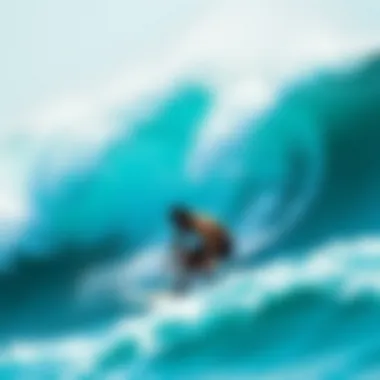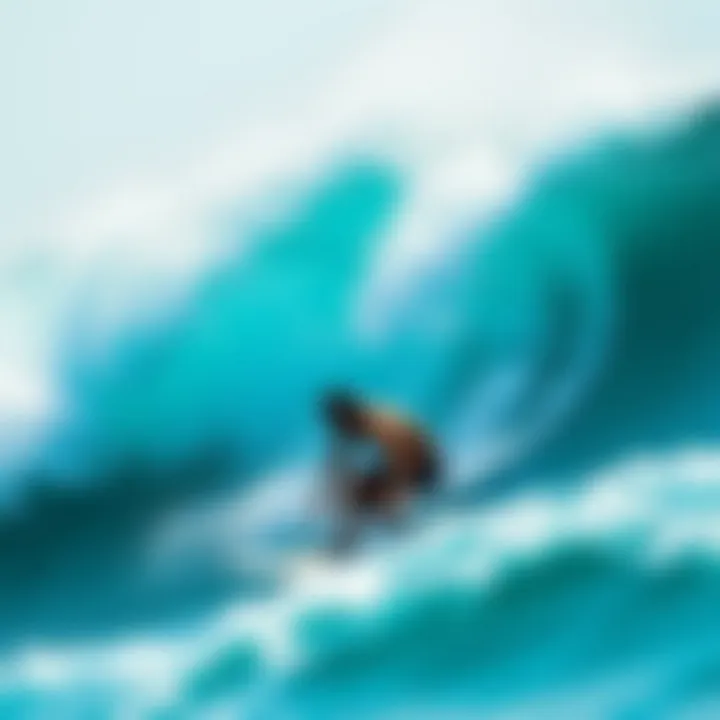Understanding Dehydration: Signs and Symptoms


Intro
Dehydration is a sneaky foe that can strike both seasoned surfers and newbies alike. While riding the waves is exhilarating, it's easy to lose track of hydration in the thrill of it all. Water doesn't just keep you going; it keeps your body functioning correctly. If you don’t pay attention, you might end up feeling drained, literally.
This article takes a closer look at the different ways dehydration can impact your body, especially when you're catching waves or even just enjoying time under the sun. We’ll peel back the layers to reveal the telltale signs of dehydration, and we’ll arm you with straightforward strategies to ensure you stay in top form whether you’re paddling out or just basking on the beach.
Techniques and Skills
Understanding the signs and symptoms of dehydration is paramount, particularly for surfers whose performances rely heavily on optimal physical condition. Before you even think of perching on your board, consider the following techniques that help identify the onset of dehydration, ensuring you remain alert while in the water.
Recognizing Early Signs
- Thirst: The most telling sign. If you’re feeling thirsty, it’s already a signal that your body is in need of fluids.
- Dry Mouth and Lips: If you can’t spit a word out without feeling your mouth dry up like the Sahara, take it as a cue to rehydrate.
- Dizziness or Lightheadedness: Getting a bit wobbly on your feet? It might be more than just a bad wave.
Stay attuned to these early warning signals for your well-being.
“Ignoring the urge to drink can turn a good surf session into a bad memory.”
Advanced Techniques for Awareness
Beyond just recognizing thirst, advanced surfers can hone their self-awareness skills to detect subtle changes:
- Monitor urine color. If it’s darker than pale straw, you need to drink up.
- Keep track of your output. If you're not visiting the restroom often, it might be time to toss back some fluids.
- Listen to your body’s aches and pains. Cramping often arises from dehydration, especially during long sessions in the water.
Equipment and Gear
Preparing to hit the waves is more than just gearing up with your favorite surfboard. The right equipment can help you manage hydration effectively, especially during prolonged sessions.
Hydration Packs and Bottles
- Invest in a reliable water bottle or hydration pack. Products like Hydro Flask and CamelBak not only keep your drink cool but are built to withstand the occasional tumble.
- Also, consider isolating hydration on the go by choosing gear with built-in compartments for fluids.
Essential Accessories for Every Surfer
Aside from your usual surf essentials, carry items that promote hydration:
- Electrolyte Tablets: Help in replenishing salts lost through sweat. Brands like Nuun or Pedialyte can be game changers.
- Cooling Towels: While not directly related to hydration, staying cool can reduce fluid loss. Plus, they feel fantastic on sun-kissed skin.
Further Reading
For more on staying hydrated during your surf sessions, check out resources from NCAA, or read about dehydration strategies on Mayo Clinic.
Stay tuned as we delve deeper into recognizing and overcoming the hurdles of dehydration.
Defining Dehydration
Dehydration is more than just a lack of water; it’s a complex physiological state that can lead to significant health issues, especially for those who engage in strenuous activities like surfboarding. Understanding what dehydration entails is the first step towards recognizing its impact on our bodies and performance.
Water plays a crucial role in almost every bodily function. From regulating temperature to maintaining joint lubrication, water is indispensable. When a person loses more fluids than they can take in, they risk entering a dehydrated state. This can happen gradually, often without conscious notice until symptoms start to surface. The importance of defining dehydration lies in empowering individuals to recognize its signs and react promptly—be it in the surf or any other facet of life.
Physiological Role of Water
Water is the bedrock of life; every cell in our body relies on it. It serves multiple vital functions including:
- Temperature Regulation: Sweat relies on water to cool the body when temperatures soar, especially during kung fu session or a long day at the beach.
- Nutrient Transportation: Blood, which is primarily water, delivers essential nutrients and oxygen throughout the body, keeping all systems running smoothly.
- Joint Lubrication: Proper hydration is crucial for cushioning joints, helping prevent discomfort during physical activities.
A lack of adequate hydration disrupts these functions and can lead to complications that might hinder performance, mood, or overall health.
Types of Dehydration
Dehydration can manifest differently depending on the circumstances. Understanding these variations can sharpen one’s awareness and preparedness in both casual and intense activities.
Hyperhydration
Hyperhydration, while seeming counterintuitive to discuss in a hydrate-or-die mentality, centers around excessive fluid intake beyond physical needs. This condition can lead to electrolyte imbalance, a notion often overlooked.


The key characteristic of hyperhydration is the surplus of water that dilutes essential minerals in the blood. For this article, it's relevant because surfers sometimes drink copious amounts of water or sports drinks believing more is better. However, doing so without consideration can lead to issues—imagine hitting the waves only to feel sluggish or dizzy due to this miscalculated approach. Advantages of hydration should complement awareness of balance. It’s about having just the right amount, rather than an overindulgence.
Hypohydration
On the flipside, hypohydration is what most think of when discussing dehydration—it’s simply the state of being under-watered. It tends to sneak up during long surf sessions or extreme heat days when fluid intake drops. The key characteristic here is the drop in body water content, which can drastically affect physical performance.
Hypohydration is a critical subject as it directly relates to health and activity levels. When surfers fail to drink enough, they may not just feel thirsty; they risk dizziness, cramping, and fatigue. The beauty of this section lies in understanding how little lapses can accumulate into substantial impact. Recognizing these risks promotes healthier habits on and off the water.
Isotonic Dehydration
Isotonic dehydration is another form that occasionally goes unrecognized. Here, there’s a loss of both water and electrolytes proportionality. It’s frequently found in instances of intense exercise without adequate replenishment—think of a surfer who has been riding waves and sweating profusely.
The primary characteristic is the equation of fluid and electrolyte loss; this can lead to a state where one feels drained without any significant loss in weight. This state is a double-edged sword; while it’s more sustainable in terms of immediate survival, it can still result in decreased overall performance. Understanding isotonic dehydration underlines the importance of not only consuming water but also ensuring that electrolytes are maintained.
Understanding How Dehydration Affects Performance
Dehydration can play a severe role in how individuals perform, particularly for those engaged in physically demanding activities like surfboarding. When significant amounts of water are lost, various systems within the body struggle, which can diminish both physical capabilities and cognitive functioning. This section delves into the distinct ways dehydration can undermine performance, emphasizing its importance for surfers and other active individuals.
Impact on Physical Performance
Physical performance often hangs by a thread when hydration levels dip. Even a small decrease in body water can lead to notable declines in strength, endurance, and overall athletic performance. Here are some key areas affected:
- Muscle Function: Muscles are primarily composed of water, and their ability to contract effectively relies on adequate hydration. Dehydration can lead to muscle cramps, spasms, and reduced coordination, making it harder to catch that perfect wave.
- Energy Levels: Water plays a crucial role in energy production. If your body’s not getting enough, you might find yourself feeling sluggish and out of steam on your surfboard.
- Heat Regulation: During intense activity, your body relies on sweating to cool itself down. Dehydration hampers this process, raising internal temperature and potentially leading to heat exhaustion or heat stroke. It's vital to maintain a proper temperature to continue surfing effectively.
- Reaction Times: When the heat is on, quick reflexes are essential, especially in surfboarding. Dehydration can impair neural communication, resulting in slower reaction times and affecting balance, which are both vital on the waves.
Keep in mind that just because you don’t feel thirsty doesn’t mean your body is hydrated. Staying attuned to your hydration levels is invaluable for those who want to push their performance peaks.
Cognitive Effects
It isn't just physical prowess that's put on the back burner due to dehydration; cognitive function takes a hit too. Your brain’s performance is heavily reliant on water, and here’s how dehydration can play tricks on your mind:
- Attention and Concentration: Losing just a few percentage points of body weight due to lack of fluid can sap your focus. This makes it harder to assess conditions on the water and maintain awareness of your surroundings, which can be dangerous in a surfboarding environment.
- Mood Fluctuations: Dehydration can contribute to irritability or increased feelings of anxiety. When you’re out surfing, staying in a positive state of mind is crucial not only for enjoyment but also for safety.
- Decision-Making: Dehydrated brains may struggle with complex decision-making. You may face tough calls, be it about the right wave to catch or the best time to paddle back. Clarity of thought is key in both surfing and life.
- Memory Impairments: Dehydration has also been linked to diminished short-term memory. Forgetting that maneuver you practiced so hard can lead to sloppy performance on the waves.
The dangers of dehydration extend beyond the physical realm, affecting cognitive abilities that are essential for sports performance.
Recognizing the Symptoms of Dehydration
Dehydration might not always raise red flags immediately, but recognizing its symptoms promptly is critical. This knowledge empowers individuals to take action before their health deteriorates further. Particularly for those who enjoy activities like surfboarding, where physical exertion meets environmental challenges, being in tune with one’s body is vital. Neglecting to identify dehydration can lead to decreased performance, increased risk of injury, and even serious medical conditions.
Physical Symptoms
The signs of dehydration typically manifest physically. It’s essential to pay attention to subtle cues that your body provides. Here’s a closer look at three common physical symptoms:
Thirst
Thirst is the body’s first line of defense against dehydration. It's not just a signal but a biological imperative. When your body starts to lose fluids, the brain sends an alert, prompting you to drink. This response is often overlooked; many people ignore it until they feel parched. Understanding this physiological aspect is beneficial because it can push individuals to hydrate proactively rather than reactively.
However, it is critical to note that by the time thirst strikes, your body may already be in an earlier stage of dehydration. The vital characteristic of thirst lies in its simplicity; yet it holds profound implications for health and performance.
Dry Mouth
A dry mouth is another telltale sign of dehydration. When saliva production dwindles, it can make swallowing, speaking, and digesting food uncomfortable. This symptom, while potentially bothersome, serves as an essential reminder to replenish lost fluids.
One unique feature of a dry mouth is that it can also trigger feelings of anxiety or discomfort, aggravating stress levels. Recognizing this symptom early can offer advantages to address dehydration before it escalates into more severe conditions.
Reduced Urination
When the body is dehydrated, urine output often decreases. This happens as the kidneys conserve water to counteract fluid loss. The key characteristic of reduced urination is that it indicates your body is prioritizing hydration.
However, the colour of the urine can also give insights. Dark, concentrated urine is often a sign of dehydration and warrants immediate attention. Relying on this symptom can be both beneficial and risky; while it is a clear signal, it needs to be interpreted promptly to prevent complications.
Cognitive and Emotional Signs
Cognitive and emotional well-being can also be heavily impacted by dehydration. As the body becomes more depleted, mental faculties often take a hit.
Dizziness


Dizziness is often dismissed as a mere inconvenience, but it can signify something more serious. When dehydrated, blood volume drops, impacting your brain's ability to function optimally. This symptom can lead to misjudgments, impaired motor skills, and, for surfers, a possible fall from the board. It is beneficial to recognize dizziness as a signal to rehydrate because doing so can help restore balance and coordination.
Fatigue
Feeling tired is more than just a bad night’s sleep; it can be a direct result of insufficient fluid. Dehydration affects physical and mental energy levels. It becomes harder to focus or even stand up straight. The characteristic of fatigue here is that it often creeps in gradually and can be mistaken for other issues, such as stress or beginning an exercise regimen. Recognizing fatigue as a potential warning flag allows for timely action, ensuring that hydration remains a top priority.
Confusion
When the brain lacks the necessary fluids, mental clarity can quickly fade. Confusion is a serious cognitive sign of severe dehydration that one should never ignore. This symptom is particularly concerning because it can lead to poor decision-making and serious consequences in risky environments like surfing. Identifying confusion early can be lifesaving—promptly drinking water or electrolyte solutions can restore clarity and focus, permitting safer experiences in and out of the water.
"Staying aware of the myriad signs and symptoms of dehydration can be your best weapon in preventing more severe health issues. Don’t wait until you feel the effects; monitor your hydration before it becomes a problem."
In summary, recognizing these signs is essential for surfers and anyone engaged in strenuous activities. Maintaining awareness can lead to swift intervention and ultimately a healthier lifestyle.
Tools to Assess Hydration Levels
Assessing hydration levels is paramount, especially for individuals who engage in physically demanding activities like surfboarding. Understanding how your body is doing in terms of hydration can prevent serious health issues and optimize performance. By implementing various tools to assess hydration, you can gain practical insights into your body’s needs.
Body Weight Monitoring
One simple yet effective method for monitoring hydration is observing body weight changes. Weight fluctuations can indicate fluid loss, making it a straightforward metric to gauge hydration status. Weighing yourself before and after a surf session can provide clues about how much fluid you may have lost through sweat. An unexpected drop in weight of 1 to 2% can signal dehydration, potentially affecting your energy and agility on the board.
Urine Color Indicators
Another widely used tool for gauging hydration is urine color. Clear to light yellow indicates adequate hydration, whereas darker shades signify a need for more fluids. This method requires minimal effort and is easily accessible for everyone. For surfers headed out for a day on the waves, a pre- and post-session bathroom check can enhance overall water management. However, factors such as certain foods and medications can skew these results, so it’s best to use urine color as a guideline rather than an absolute measure.
Subjective Assessments
Subjective assessments add a personal touch in gauging hydration levels and can provide a comprehensive view of one’s hydration status through various lenses.
Visual cues
Visual cues can significantly enhance one’s assessment of hydration. Observations like skin elasticity, dryness of lips, or a parched tongue can offer immediate visual feedback. This option is popular due to its simplicity and speed—no gadgets required. However, while visual cues are beneficial, they are somewhat subjective. Different individuals may have varying thresholds for interpreting signs of dehydration, so it's vital to combine this with other hydration strategies.
Feedback from peers
Engaging with peers provides an additional layer of support in hydration assessment. Fellow surfers can be vital in spotting signs of dehydration that you might overlook. They may note your energy levels, skin appearance, or even how often you’re stopping for water. The advantage of group feedback lies in its collaborative nature, allowing for a more rounded perspective. But keep in mind that the observations are inherently subjective, and differences in knowledge and experience among peers can influence the feedback received.
By integrating these various assessment tools, surfers can cultivate a more comprehensive strategy to stay hydrated, enhancing both performance and health in and out of the water.
Prevention Strategies
Recognizing the importance of prevention strategies in managing dehydration is key, particularly for surfers who engage in prolonged physical exertion under the sun. Adopting thoughtful hydration practices not only helps in avoiding dehydration but also enhances overall performance and enjoyment during surf sessions. While it might seem straightforward, understanding how to approach hydration in different environments and conditions can turn a challenging experience into a rewarding one.
Hydration Planning
Hydration planning is more than simply drinking water when thirsty; it's about being proactive and strategic. For surfers, this involves assessing their water intake before, during, and after a session. Planning your hydration should consider factors such as weather conditions, duration of surfing, and individual sweat rates.
- Pre-Surf: Start your day with a solid hydration foundation. Aim for at least 16-20 ounces of water a couple of hours before hitting the waves.
- During Surfing: It’s easy to forget to drink when caught up in the fun of riding waves. Bringing a water bottle with you on the beach or even in your surfbag can serve as a reminder to take sips every 15-20 minutes.
- Post-Surf: After you’re done, rehydrate with water or a sports drink that replenishes electrolytes lost during your workout.
Incorporating a structured hydration plan can significantly capitalize on performance and help prevent fatigue and cramps.
Utilizing Electrolytes
In addition to plain water, electrolytes play a vital role in hydration, especially during intense physical activities. When surfers sweat, they don’t just lose water, but also essential minerals like sodium, potassium, and magnesium. Replenishing these can greatly enhance recovery and reduce the risk of cramping and fatigue.
- Electrolyte drinks: Look for beverages that offer a balance between carbohydrates and electrolytes, and try to avoid those packed with sugar.
- Natural Sources: Coconut water, pickles, and citrus fruits can be excellent natural sources of electrolytes and provide a refreshing alternative.
Finding the right balance of fluids and electrolytes helps in maintaining stamina and focus throughout surfing sessions.
Adjusting to Climate Conditions
Weather can be a significant player in hydration tactics. Humidity, temperature, and wind can all affect how much hydration a surfer needs. Awareness of these factors can be crucial in managing dehydration risks.
- Hot and Humid Conditions: In these circumstances, fluid loss via sweat increases considerably. A higher intake of fluids is essential. Aim for cooler, lighter-colored clothing and find shaded areas to rest.
- Cooler Weather: Even when it’s chilly, dehydration can still sneak up on you. The body may not feel thirsty, but it continues to lose moisture. Ensure you keep drinking fluids, even if you aren't sweating as much.
- Windy Days: Wind can increase evaporative losses. Carry a water bottle and keep sipping more frequently to counteract this effect.


Understanding your environment and adjusting accordingly can be a game-changer for performance. Mistakes in hydration often arise not from lack of care, but from being unprepared.
By embedding these hydration strategies, surfers not only mitigate the risks of dehydration but also optimize their surfing experience. Whether tackling beginner waves or riding the big ones, keeping hydrated is essential not just for health, but for enjoying every ride to the fullest.
Hydration Considerations for Surfboarding
Surfing isn’t just about catching waves; it’s also about taking care of your body. While you’re balancing on your board, you might forget to pay attention to what your body truly needs, especially hydration. Understanding hydration considerations tailored specifically for surfboarding can be the difference between a great day on the water and one that leaves you feeling drained and exhausted.Engaging in such a physically demanding sport while neglecting hydration can lead to serious consequences. Surfers need to realize that hydration is as crucial as mastering the perfect wave.
The Importance of Hydration for Surfers
Maintaining proper hydration levels is equally important for skilled surfers and those just dipping their toes into the water. Here are a few reasons why hydration is vital:
- Performance Maintenance: Dehydration can cause a significant dip in your energy levels. Balancing on a moving surfboard requires focus and stamina. If you're not hydrated, you're likely to feel fatigued and less coordinated.
- Heat Regulation: Surfing often takes place in warmer climates. The body loses a lot of water through sweat during a vigorous session in the sun, making it imperative to replenish fluids to avoid overheating.
- Muscle Function: Hydration ensures optimal muscle function. Dehydrated muscles are prone to cramps, which can ruin a session and lead to injury. Imagine paddling out, then suddenly feeling your calf lock up; not a fun scenario.
Best Practices on the Beach
When spending long hours at the beach, follow these best practices to ensure you stay hydrated:
- Pack a Water Bottle: Always have a reusable water bottle on hand. Electrolyte drinks can be great but be cautious about sugar content, which can sometimes backfire.
- Set Reminders: It’s easy to forget to drink water when caught in the moment. Setting alarms on your phone or other devices can help you sip regularly throughout your beach day.
- Monitor Your Urine Color: A simple but effective method to assess hydration levels is checking your urine color. Light yellow is usually a sign of adequate hydration, while dark urine indicates a need for more fluids.
- Eat Hydrating Snacks: Fruits such as watermelon, oranges, or cucumbers not only provide water but also vitamins and minerals to help replenish lost nutrients during your surf session.
- Shade Breaks: Make it a point to take breaks in the shade. This helps regulate your body temperature and provides an opportunity to drink without the sun's unrelenting heat.
At the end of the day, remaining conscious of your hydration in the surf ensures you stay on top of your game, ready to ride the next wave. By incorporating these practices into your routine, you’ll not only improve your performance but also enhance your overall enjoyment.
When to Seek Medical Attention
Dehydration, while often manageable at home, can escalate quickly. Understanding when to seek medical attention can be the difference between a minor inconvenience and a serious health concern. The body is a delicate balance of fluids, and even minor disturbances can lead to significant impacts, especially in active individuals like surfers. Arrowing in on the signs of serious dehydration can prevent serious complications.
Mild Dehydration Remedies
In cases of mild dehydration, immediate intervention is crucial. Symptoms might include slight dry mouth, feeling a tad tired, or urine that's just a touch darker than usual. Thankfully, remedies abound, and many of them can be self-administered:
- Water Intake: Slowly sip on water. Chugging it all at once often doesn't do the trick. Aim for intake that can be easily absorbed.
- Electrolyte Drinks: Beverages like Gatorade or plain coconut water provide not just hydration but also essential electrolytes.
- Soups and Broths: These contribute both fluid and nutrients, making them particularly effective.
- Fresh Fruits: Watermelon, oranges, and cucumbers are hydration champions packed with vitamins.
Engaging in outdoor pursuits, especially in sunny weather? Keeping a water bottle handy is smart. Check your hydration levels periodically during the day, especially if you're planned to be out for long.
Severe Dehydration Signs
On the flip side, it's essential to recognize when dehydration escalates to a severe state. This can manifest as:
- Intense Thirst: A physical and urgent need for fluids that goes beyond the normal.
- Little to No Urination: If you’ve gone hours without urinating, it’s a serious flag.
- Dizziness or Confusion: This can lead to falls and accidents, particularly dangerous in outdoor settings.
- Rapid Heart Rate: The heart may start racing as it struggles to pump blood adequately.
If you notice any combination of these signs, it’s best to seek medical attention without delay. Ignoring severe dehydration may lead to serious complications, such as heat exhaustion or even heat stroke. Knowing when to act can protect not only your surfing experiences but your overall health.
"Awareness is half the battle. Understanding how your body reacts to dehydration can keep you safe and ready to ride the waves again."
Recognizing these signs early can save not just your day, but your life. Learning the balance between hydration and exertion is vital in ensuring that you stay at the top of your game.
End
The importance of recognizing the signs and symptoms of dehydration cannot be overstated, particularly for those engaged in activities like surfboarding. This conclusion serves as both a reminder and an empowerment tool; understanding dehydration means we can actively prevent it. The key elements discussed highlight how water plays a vital role in overall health and performance. The physiological consequences of dehydration are stark, affecting not only physical capabilities but also cognitive functions. This article has explored the various symptoms, tools for self-assessment, and practical prevention strategies that can enhance awareness.
One of the benefits of being mindful of hydration is injury prevention. Surfers and others often overlook minor signs that could lead to more severe conditions if ignored. Incorporating the knowledge gained here can lead to improved performance on the water and a healthier lifestyle overall.
It’s crucial to recognize that everyone’s hydration needs can vary based on several factors: activity level, climate conditions, and individual health. Always tailor hydration strategies to fit personal experiences.
As mentioned previously, it’s not only about staying conscious of personal hydration levels — the ripple effect affects friends, students, and the entire surfing community. Educating others about hydration can foster a healthier environment, ultimately making surfing more enjoyable and sustainable.
"An ounce of prevention is worth a pound of cure."
Therefore, whether you're riding the waves or lounging on the beach, keep hydration at the forefront. Understanding dehydration and its signs equips you with the knowledge to act swiftly, ensuring that both your performance and enjoyment remain at peak levels.
Summary of Key Points
In summary, the following key points stand out from the discussions provided:
- Physiological Role of Water: Water is essential for bodily functions.
- Signs and Symptoms of Dehydration: Recognizing physical and cognitive symptoms is crucial.
- Assessment Tools: Use body weight monitoring, urine color indicators, and subjective assessments.
- Preventive Strategies: Hydration planning, electrolyte use, and climate adjustments can be beneficial.
- When to Seek Medical Attention: Understanding the difference between mild and severe dehydration.
Encouragement for Awareness
Awareness is half the battle in managing dehydration. Educating oneself and others around the topic can be life-changing. Solid knowledge not only safeguards health but empowers individuals to make informed decisions. For instance, a surfer who shares their hydration strategy can ignite a positive change in their circle. As community members, let’s encourage others to recognize the subtle signs of dehydration.
Engagement can come in many forms, from organizing community hydration awareness events to sharing posts on social media platforms like Reddit or Facebook. Each small effort adds up. It’s all part of building a culture that prioritizes hydration. Everyone benefits when we keep each other informed and proactive.







